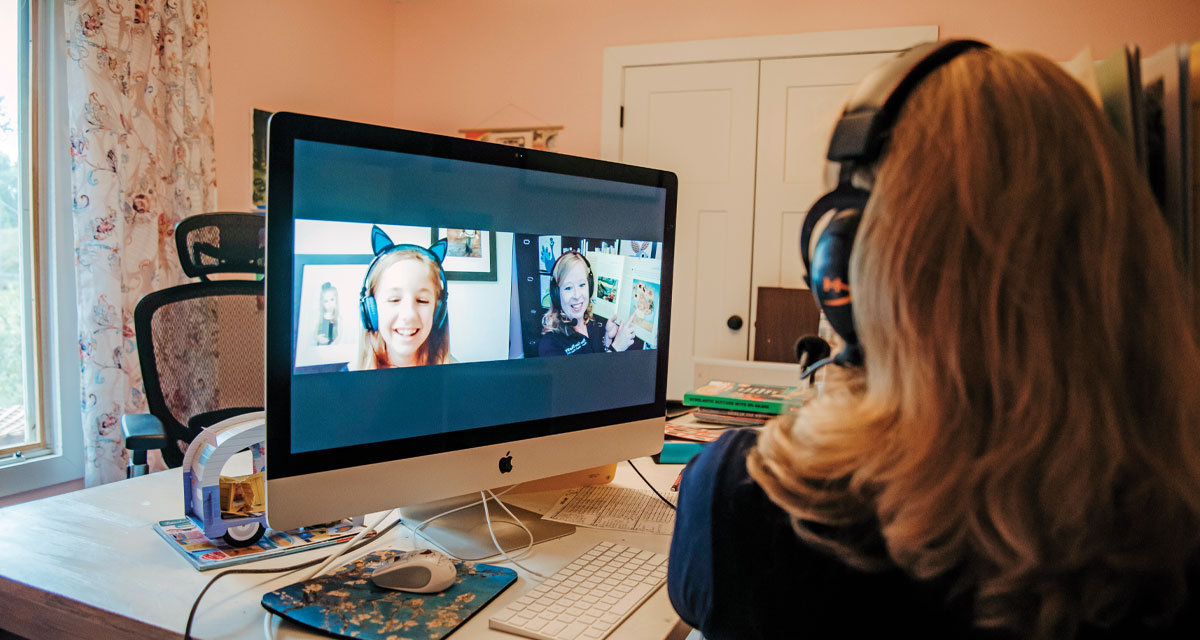Speech is one of the most valuable tools we have as humans. We use our voices to express our feelings and communicate our needs. However, there are times when that tool doesn’t function as well as it needs to, and that is where speech pathology can make a huge difference. SpeakEasy Therapy has been providing speech-language services in our community for the last ten years, and now they’re adapting to continue that care through a pandemic.
Julie Casey has over 23 years of experience as a speech pathologist. She started her career working in public and private schools. In 2009, she found herself in a situation where a declined school enrollment had the potential to affect her position. She spent the next year analyzing the Triad’s needs regarding speech to see if she could go out into the community independently and provide needed services. She discovered a need in the preschool-age population that was under-served at the time and was thrilled to make this change in her career. By 2010, she found that the preschools and daycares in which she worked needed speech pathologists on an even greater level than she could manage alone, so she began to build the team that became SpeakEasy Therapy.
For the last ten years, SpeakEasy has visited daycares and preschools to screen and work with children from 18 months to five years old. They would also partner with parents and childcare providers to meet the child’s needs by training these adults to continue the care between sessions. Most of their patients would typically be discharged as children entered the public school system at age five, where public school speech pathologists would be available.
Then came the pandemic. This new world we’re living in has changed how daycare centers and preschools can allow speech therapy to be provided to their children. Unfortunately, because of COVID-19-related regulations, speech pathologists have been unable to enter many of these facilities since March of 2020, despite the children’s continuing needs. This concern got Julie Casey to consider how to still provide for children’s needs during this time.
As one might imagine, wearing a mask and practicing social distancing can significantly affect the ability to provide traditional speech therapy services, but telehealth has become the answer. Therapy sessions on the Zoom platform had not been provided on a widespread basis in the past in the profession, and insurance wasn’t sure how or if they would cover it. But as telehealth became our society’s new normal, and with the provision for training on teletherapy for her team, Julie and her providers realized that teletherapy is not that different from a traditional instruction method. It’s just another delivery system. It’s challenging to provide speech therapy when the speech pathologist or child is wearing a mask, because many therapy techniques require visual and auditory cues provided by the speech pathologist. The teletherapy platform allows her team to deliver the services mask-free and provide quality sessions, so children can continue to receive and implement the skilled interventions that they are used to receiving from these clinicians.
One of the best facets of SpeakEasy Therapy is that they don’t just treat the child’s speech needs, they have a desire to partner with, and support, families with needs that may go beyond just speech. Their team understands special needs and the impact they can have on family life. The team works with various children, from those who have mild speech differences to children with more impactful developmental delays. These speech pathologists support families as they move through the referral process with everything from helping to make outside referrals to just providing a listening ear. They are grateful for the opportunity to serve in this capacity and believe it is God’s blessing to their team to have the chance to encourage parents’ attempts to help their child, listen to families’ concerns about the next steps to take, and develop relationships with families that will help these children to be the best communicators they can be.
Parent Michelle Barson shared thoughts from her family’s experience and the transition to virtual sessions. “Our family has worked with SpeakEasy since my son, Beckett, was two years old. We quickly found the best fit for our family to do private and public [school] speech therapy. We have done two private sessions a week almost since we began with SpeakEasy and wouldn’t have been able to do so if they weren’t so great to work with.”
“While my son was in preschool, Julie would come and meet with him there. He has gone to two different schools, and both administrations and teachers have LOVED Julie and are impressed with the way Beckett loves to see her, and how much he improves by working with her.”
“When the pandemic hit, I was panicked. I didn’t know how I would keep up my son’s language skills. Julie proposed doing speech therapy via Zoom. At first, I was hesitant. I couldn’t figure out how virtual speech would ever work for our then five-year-old. Julie convinced me to try it just one time, and we did…and it was awesome! I had no idea a little kid could focus and engage with a therapist over the computer. In fact, his focus has even improved! The best part is, it doesn’t seem to have impacted the personal relationship the two have built over the years.”
SpeakEasy Therapy has six speech pathologists on staff that have each been practicing in the field for many years. All of them have master’s degrees in speech-language pathology, are nationally certified by the American Speech & Hearing Association (ASHA), and are licensed in North Carolina.
Julie Casey, Melinda Cottonaro, Katie Morin, Brandi Sacrinty, Lauren Matthews, and Mandi Watson can provide various services, including speech & language screenings, evaluations, and speech therapy. Typical speech therapy may focus on speech sound production, receptive (how a child understands), and expressive (how a child expresses his thoughts and needs) language skills, or stuttering. With public education now occurring in most homes, parents may be noticing speech-language problems with their school-age child that they had not noticed in the past, but now, with increased difficulty for their children to have access to a public school speech therapist, they have become more apparent. With the addition of teletherapy services to their repertoire, SpeakEasy Therapy can provide additional types of services that may affect school-age children. Many families are reaching out for assistance to increase their child’s phonological awareness skills (connecting and manipulating letters and sounds) and auditory processing skills, in addition to the skill needs mentioned above. SpeakEasy Therapy can fit the bill. All services are available for children age two years through school age.
For more information about SpeakEasy Therapy, you can call the office at 336-946-2493 or e-mail them at info@speakeasytx.com. You can also follow them on Facebook by searching for SpeakEasy Therapy PLLC.























